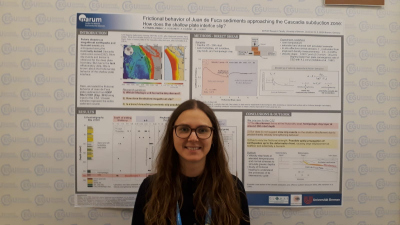- Graduate School GLOMAR
- PhD student reports
- Conference Reports
- Conference Reports 2019
- Katja Stanislowski
Katja Stanislowski
Report of GLOMAR PhD student Katja Stanislowski about her participation in the European Geosciences Union General Assembly (EGU) 2019 in Wien, Austria from 7 to 12 April
The European Geosciences Union General Assembly (EGU GA) is the largest geoscientific conference in Europe and one of the largest in the world. From 7 to 12 April 2019, over 16,000 scientists from 113 countries came to Vienna, Austria, presenting their work in almost 700 different sessions.
The focus of my research is to study the velocity- and time dependent frictional behavior of natural and analogue fault zone material playing a key role in unstable slip on fault systems. Unstable fault slip can occur slowly and non-destructively or fast as earthquakes with destructive consequences such as ground motion, landslides and tsunamis. Covering the research fields of tectonics and structural geology, seismology, and natural hazards, this year’s program of the EGU GA offered a series of interesting sessions relevant to my research, especially those on brittle deformation and fault-related processes.
In the form of a poster I presented my study on the slip behavior of the shallow plate interface at the Cascadia subduction zone offshore Vancouver Island in the very well matching session “Earthquakes: from slow to fast, from the field to the laboratory and models”. This session consisted of oral and poster presentations given and convened by leading researchers in the field. New methodological approaches, results, and their implications presented in the oral session provided valuable insights to state-of-the-art earthquake research. The highly attended subsequent poster session offered the perfect opportunity to network and discuss about both talks and posters directly with the contributors as well as with other PhD students, postdocs, and well-established scientists. In addition, I also had very lively discussions about my own studies providing me with useful feedback and new perspectives that will be very helpful for writing my current manuscript and my ongoing research.
Along with scientific sessions, the EGU GA program also includes a variety of short courses in career development, science communication, and skillset building, of which I took a course on seismology to strengthen my knowledge in the detection and localization of earthquakes. Having participated in the IODP Expedition 358 offshore Southwest Japan, the IODP/ICDP townhall meeting was a great opportunity to meet science party members again and discuss about post-cruise research and collaboration.
In summary, I greatly benefitted from attending the EGU GA 2019. I got a very good overview of current research, received input for my own work, and strengthened and expanded my network in the scientific community of my field of research. I therefore kindly thank GLOMAR for the financial support to attend this impressive conference.



